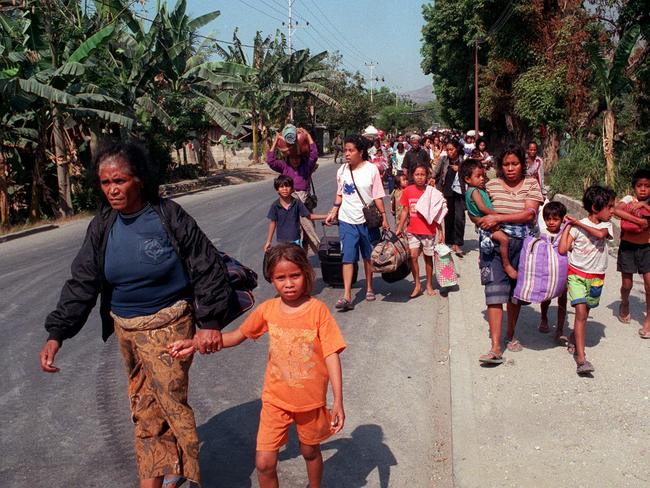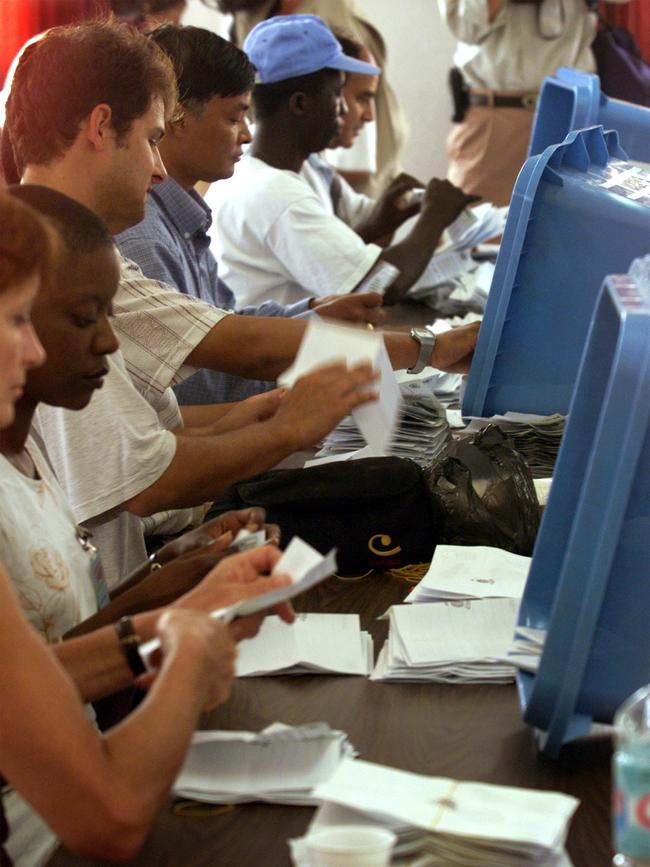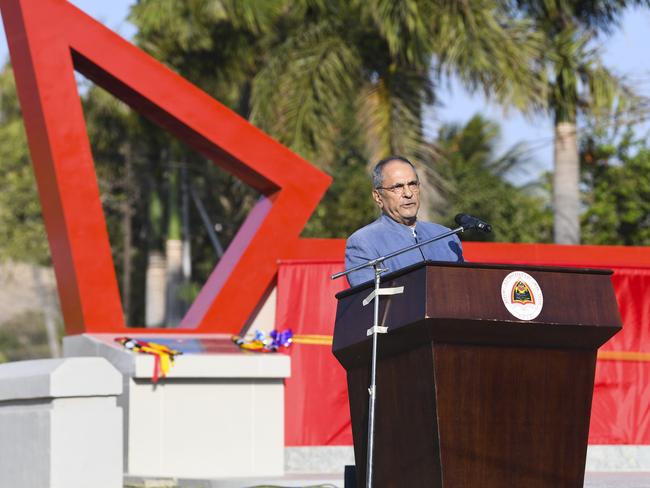Feature read: Territorians reflect on 20 years of Timorese independence
AUGUST 30 marks 20 years since the East Timorese voted for independence from Indonesia. This is the story of that vote and its aftermath, from the perspective of Territorians who lived through it
Northern Territory
Don't miss out on the headlines from Northern Territory. Followed categories will be added to My News.
FRIDAY marked 20 years since the East Timorese voted for independence from Indonesia. This is the story of that vote and its aftermath, from the perspective of Territorians who lived through it.
WHEN Rosa Carrascalao landed in Dili in 1999, she noticed through the din of a country in chaos a sound that was missing.
There were no birds.
They had fled, along with tens of thousands of East Timorese, driven out by the fighting and the flames that followed the vote for independence on August 30, 1999.
It was the first time Carrascalao had been to her home country in 15 years.
She and her family were forced out during the brief civil war which preceded the Indonesian invasion in December 1975.

Her husband Joao was a leader within the UDT party which lost the bloody struggle for control against the opposing Fretlin forces during that civil war.
In the decades that followed, old foes within UDT and Fretilin united against the Indonesian invaders. Joao was a leading figure among the leaders in exile, as was Carrascalao’s brother, Jose Ramos-Horta.
Carrascalao worked two jobs to support her husband and the resistance movement. It was expensive work, accepting reverse charge calls from Indonesia with snippets of information from home. Once, the Carrascalaos’ phone was disconnected for five months after they couldn’t pay a $2000 bill.
****

ALICE Branco was studying at university in Lisbon when Indonesia invaded Timor. She knew there was no way home.
She lived the next decade in exile in Portugal and Mozambique, helping the resistance by receiving and decoding messages from guerillas in Timor, working with refugees and supporting future leaders including Mari Alkatiri and Jose Ramos-Horta to spread the message about the atrocities unfolding on the other side of the world.
In 1983, Branco received a reunion visa to join her family in Australia. They had settled in Darwin as refugees, driven out during the civil war.
She stayed committed to the cause, running Timorese radio programs and Tetun language programs.
When the referendum was granted in 1999, Branco worked to mobilise Darwin’s Timorese population.
Branco’s father had a 12-seater van and would drive through the city’s suburbs picking up the 2000 Darwin Timorese to take them to the electoral commission to register to vote.
On September 4, five days after the August 30 ballot, they received the news they had worked 24 years for.
Independence at last.
******

IN Darwin, there were celebrations. Timorese piled into cars and tore through the streets, flags of the resistance movement billowing in the dry season breeze.
But there was an undercurrent of fear. They didn’t know how the Indonesians or the militias loyal to them would react to the result and feared for friends and family back home.
The celebrations came to an abrupt end as news filtered in from Dili.
“The Indonesians went on a rampage. Killing people, burning houses. The capital was razed,” Branco says.
The violence escalated and then they received devastating news— UNAMET, the United Nations mission tasked with overseeing the ballot - would evacuate. The Timorese were on their own.
Branco and others caught wind a group of Australian military leaders was at Darwin RAAF base and rushed there to beg them to do something. Fear turned to fury.
“We banged the walls, we wouldn’t leave,” Branco recalls.
“We were angry, shouting ‘you need to go, you need to go. Our people are dying’.”
Eventually, their pleas — and those of thousands of others around the world — were heard.
Australia would lead a peacekeeping coalition of 22 nations into East Timor. The International Force for East Timor — INTERFET — was born.
Branco remembers the relief washing over her.
“We knew once INTERFET arrived in Timor, we had won,” she says.
*****

DARWIN cafe owner Sam Weston — then an 18-year-old army cook only a year out of school — had just touched down in Hawaii for an eight week rotation with the 5th/7th RAR Battalion when his commanders received the order.
They were to turn around immediately and return to Darwin ahead of deployment to Dili with INTERFET in a fortnight. Two other battalions, 2RAR and 3RAR, were already on their way.
Most knew nothing about East Timor before their deployment. They weren’t prepared for what they found there.
“You didn’t join the army thinking you would be going to war back then. You joined the army to get a trade and jump out of helicopters,” Weston says.
By the time he and his 5/7 colleagues arrived in Dili aboard the recommissioned commercial ferry HMAS Jervis Bay on October 10, 1990 at least 1500 Timorese were dead and hundreds of thousands more displaced.
Weston recalls the “aroma of death” which hung in the air as they pulled into port.
“The whole city looked like it was on fire,” he says.
“The Indonesians had burned every government building, every bank. They killed a lot of people and caused a lot of damage.”
The first few months were “confusing”, he says, as the peacekeeping force found its feet and figured out its role. They were an army without a real enemy, showing up to a war 24 years late.
“These people had been bashed, beaten and tortured for 25 years. Their culture, their whole way of life had been abused,” he says.
*****

DURING the Indonesian occupation, Timorese freedom fighters used as a rallying cry a political slogan adopted from the revolutionaries of Mozambique.
“A luta kontinua” translates to “the struggle continues”.
For 24 years, their struggle was for the right to choose their destiny.
That struggle ended August 30, 1999.
Branco finds it difficult to put into words how it felt to mark the ballot paper before her that day.
“It was an achievement of so many years of struggle, being able to free the people from so much oppression and violence,” she says.
But twenty years later, Branco says her overwhelming feeling is one of disappointment.
She reels off a long list of “social sicknesses” which infect her country — corruption, collusion, nepotism, inequality. These are the new enemies.
“Before we were fighting outside, now we are fighting within,” she says.
A luta kontinua.
*****

On Thursday, ahead of the anniversary celebrations, Jose Ramos-Horta opened a new bridge in the heart of Dili.
The bridge is named for former Indonesian president BJ Habibie who granted the Timorese the snap referendum.
But Carrascalao says his failure to ensure a safe withdrawal after the vote must not be forgotten.
In her eyes, the bridge her brother opened is a scar on Dili and a permanent reminder that perpetrators of war crimes against the Timorese still live freely just over the border, unpunished.
Carrascalao fears justice has been sacrificed in the name of reconciliation.
“We will be the first country in the world to put the name of our invader on our bridge,” she says.

Carrascalao and Joao returned to Dili to live after the vote and Joao served as infrastructure minister in the transitional administration.
After his death in 2012, Carrascalao left Timor to settle in Darwin’s northern suburbs where she still does what she can to help, finding people jobs and assisting Timorese who come to Australia for medical treatment.
It also means she is closer to her daughter Sandra Nelson, who followed Joao into politics and is the Labor MLA for Katherine. Nelson was in Dili on Friday, representing the Territory at the referendum anniversary celebrations.
AMAZING OFFER: Subscribe to the NT News online for just $5 a month (min $5)
Like Branco, Carrascalao sees in lurid colour the problems of postcolonial Timor; corruption and a widening gap between rich and poor.
“There is so much waste for things that are not essential,” she says.
“We have highways, but the hospital is run down, the schools are run down. The parliamentarians have free lunch but the school kids have no lunch.”
But she still feels optimism for the future of her independent nation.
The birds are singing again.
Hayley Sorensen is a reporter at the NT News and former English editor of The Dili Weekly


